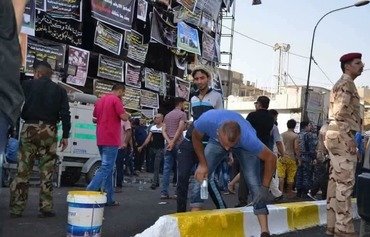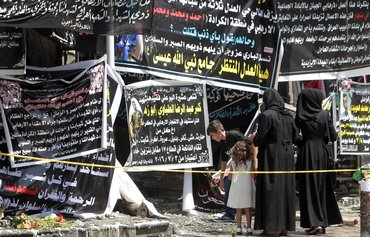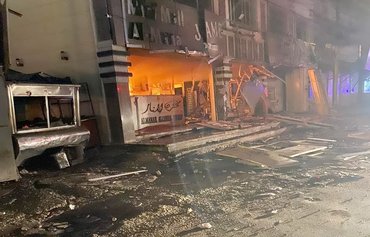Little by little, life is returning to normal in Baghdad's al-Karrada neighbourhood, where on July 3rd a minibus packed with explosives devastated a bustling shopping centre, killing and wounding hundreds of citizens just before Eid al-Fitr.
The attack, which was claimed by the "Islamic State of Iraq and the Levant" (ISIL), was the worst such attack in Iraq in over a decade in terms of casualties with nearly 300 reported killed.
Stores have now reopened their doors, noise and laughter can once again be heard from coffee shops, and delicious food can be smelled from eateries along the street.
"There was indeed a high number of victims, mostly young people, but nonetheless, life must go on," said Ahmed al-Obaidi, owner of a men's clothing store in al-Karrada.
"This street will not die out because of a passing terrorist incident," he told Diyaruna. "On the contrary, the explosion has caused a backlash in the form of greater solidarity and sympathy for al-Karrada, turning the site of the blast into a pilgrimage destination for people from the capital and all other provinces."
After the bombing, the street was closed down for many days by the authorities for security reasons, but the people and merchants of al-Karrada demonstrated, demanding the area be re-opened.
"We went out in demonstration near Kaharamana Square at the entrance to al-Karrada, demanding officials in the area to speed up the opening of the main street," said Ahmed Salman, who owns a bookstore in al-Karrada.
"We are truly sad for our friends and loved ones who have died in the blast, but sorrow is not a solution and terrorism cannot be confronted by capitulating to it," he told Diyaruna. "On the contrary, we must fight them by insisting on life and joy."
Reconstruction efforts
Local authorities mobilised resources shortly after the bombing to carry out cleaning, debris removal and repair works in the area in an effort to restore normality quickly.
"Once security and investigation procedures in the area were over, Amanat Baghdad initiated works to remove debris and remnants left by the terrorist bombing," said Amanat Baghdad's director of public relations Hakim Abdul Zahra.
One of the main challenges in the affected area is repairing damaged water and sewer pipes and broken sidewalks and traffic islands, he told Diyaruna.
Amanat Baghdad also has entrusted a number of Iraqi universities with assessing the extent of the damage caused to buildings and the possibility of restoring or rebuilding them, he added.
Public-private collaboration
Al-Karrada's main street is open for vehicles and traffic is once again flowing in the area, said Mohammed al-Rubaie, deputy head of the Baghdad Provincial Council's security committee.
Security forces have stepped up measures at the entrances to al-Karrada, deploying teams of trained police dogs and installing new surveillance cameras, in addition to carefully inspecting every vehicle entering the area, he said.
Life has returned to al-Karrada thanks to co-operation between government agencies and civilians, al-Rubaie said.
"While the government has set up teams to rebuild the area and compensate those affected, there are hundreds of volunteers carrying out maintenance, painting and restoration works at the site of the bombing."
Volunteers and government authorities have so far donated more than 3 million Iraqi dinars to al-Karrada, which have been deposited in a special fund to later be spent for reconstruction, he said.
Investigations under way
Despite the positive efforts, Iraqi citizens are still deeply upset by the incident.
"The hearts of Iraqis in general and al-Karrada residents in particular will remain upset until the perpetrators and the instigators are arrested and given just punishment," al-Rubaie said.
Iraqi political analyst Ghalib al-Shahbandar called on the Iraqi government to initiate a public, transparent and extensive investigation into the matter.
"The blood that has been shed in al-Karrada deserves a greater governmental effort," said al-Shahbandar, whose son, journalist Ammar al-Shahbandar, was killed in the incident.
The Higher Judicial Council has instructed the Central Criminal Court of Iraq to review the al-Karrada bombing in order to hold a thorough investigation into the incident and capture the perpetrators as soon as possible, the council said in a statement.

![Municpal workers clean the streets in the city of al-Karrada after an attack hit a busy market at the end of Ramadan. [Photo courtesy of Amanat Baghdad Facebook page]](/cnmi_di/images/2016/07/27/5936-karada-normal-again-600_384.jpg)






